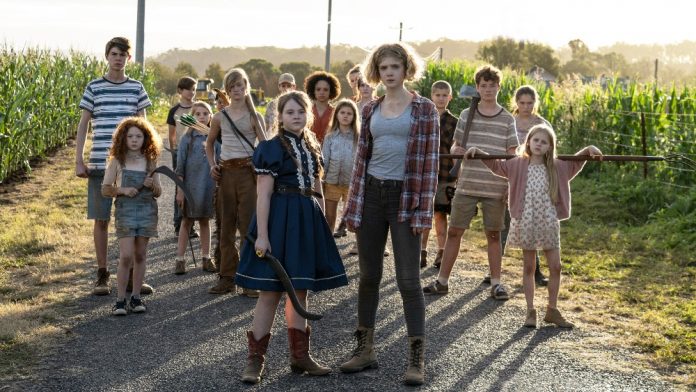Kurt Wimmer had been writing scripts in Hollywood since the early ’90s, but it wasn’t until his second feature as a director, the well-timed 2002 sci-fi action movie Equilibrium starring Christian Bale, that he started to get more attention from both genre fans and the industry at large. His 2006 follow-up, Ultraviolet, starred Milla Jovovich and didn’t fare as well, but Wimmer continued to write screenplays, including Street Kings, Law Abiding Citizen, and the hit Angelina Jolie vehicle Salt.
Wimmer is now back behind the camera directing a new adaptation of Stephen King‘s classic short story Children of the Corn, which is actually the filmmaker’s third “remake” in a row after writing 2012’s Total Recall and 2015’s Point Break.
This new take on King’s terrifying tale stars Elena Kampouris as Boleyn Williams, a teen living in a rural Nebraska town where the future seems bleak after adults ruin the season’s crops. Meanwhile, something has definitely gotten into the local youth, who, led by young Eden Edwards (Kate Moyer) and possibly controlled by something within the acres of surrounding cornfields, start enacting violent revenge against their parents.
Above the Line spoke with Wimmer over Zoom a few weeks back to learn more about where he’s been and what he’s been up to the last few years before he decided to jump back into filmmaking with both feet and tackle Stephen King.
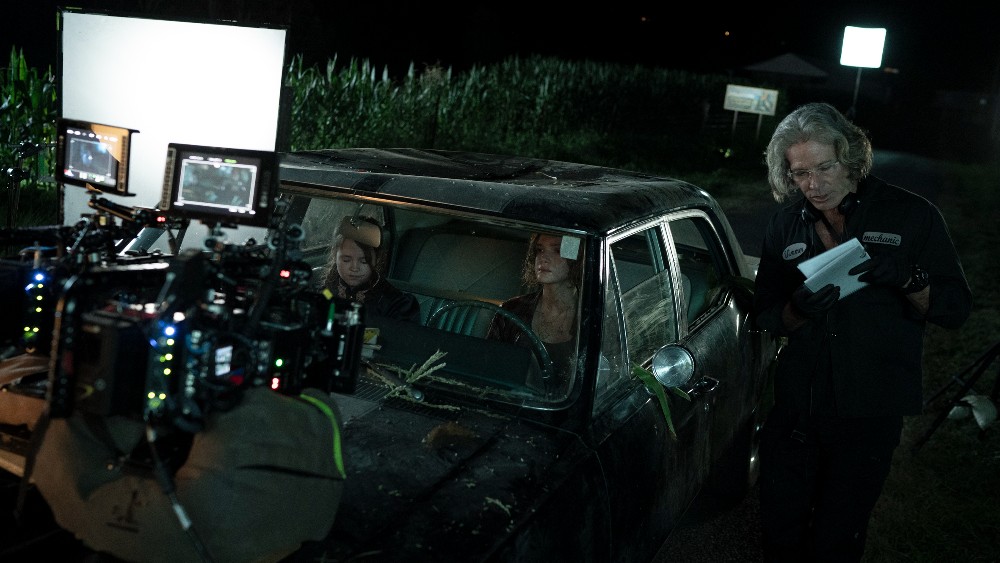
Above the Line: You stepped away from directing for a while, so when I saw this movie was coming out and that you had directed it, it was a pleasant surprise.
Kurt Wimmer: I’ve been writing. After Ultraviolet came out and it didn’t do what I wanted it to do, I said, ‘You know what? I need to bifurcate my career.’ I didn’t want to make the directing part of my career and the writing part of my career interdependent on one another, so I said, ‘I’m just going to write and get a bunch of films made to show people I can do it.’ I did that, and then I said, ‘Okay, now I’m ready to start focusing on directing again.’
ATL: I’ve spoken to a number of writer-directors over the years, and I remember Guy Ritchie, in particular, telling me that he just wanted to focus on directing for a while, since being on set is his favorite part of the job, as opposed to sitting alone at his computer. I also talk to many writers who get into directing their own scripts and just want to keep doing that once they make the leap.
Wimmer: It’s not always your choice which you do, and you gotta be careful. I mean, Guy Ritchie is in a different boat, obviously, because he came out of the gate with two really great movies — Lock, Stock [and Two Smoking Barrels] and Snatch, and then, he married Madonna, so he had a lot of firepower underneath him. Really, I just wanted to stabilize everything, and I wanted to learn more about writing, and I still do. I’m still obsessed with becoming a better and better writer and learning everything I can about it.
ATL: Children of the Corn is based on a Stephen King story that was adapted into a movie in the ’80s that eventually spawned this franchise, although I personally haven’t seen any of the movies that went straight to video. So how did the project come your way, and were you a fan of the franchise heading into it?
Wimmer: I didn’t see the sequels — I know there have been a lot of them — but from what I hear, they haven’t been the greatest movies, [and] yet Children of the Corn persists. It’s a name that even really young people know. They don’t know the movies, they don’t even know the story, but what’s really genius of Stephen King is the title of this movie. In that title, you know almost everything there is to know about the movie, even if you have no familiarity with it at all. Because corn is inherently creepy, and kids can be creepy, and when you put them together, you’ve got extra-super-creepy. It’s just such a great title.
And then, of course, he built it around this barebones story. It’s not a very long story if you read it, but it’s also something that’s adaptable [from] generation to generation. “Why do kids today want to kill their parents,” versus “why did kids in 1982 want to kill their parents?” I think the reasons are different. In the original story, they were religious fanatics, and the parents, like in this story, were corrupted. [But] religion is not at the basis of this [film], and I don’t think it would be appropriate, either. I think there are certainly more relevant things that kids could, should, and would be upset about today.
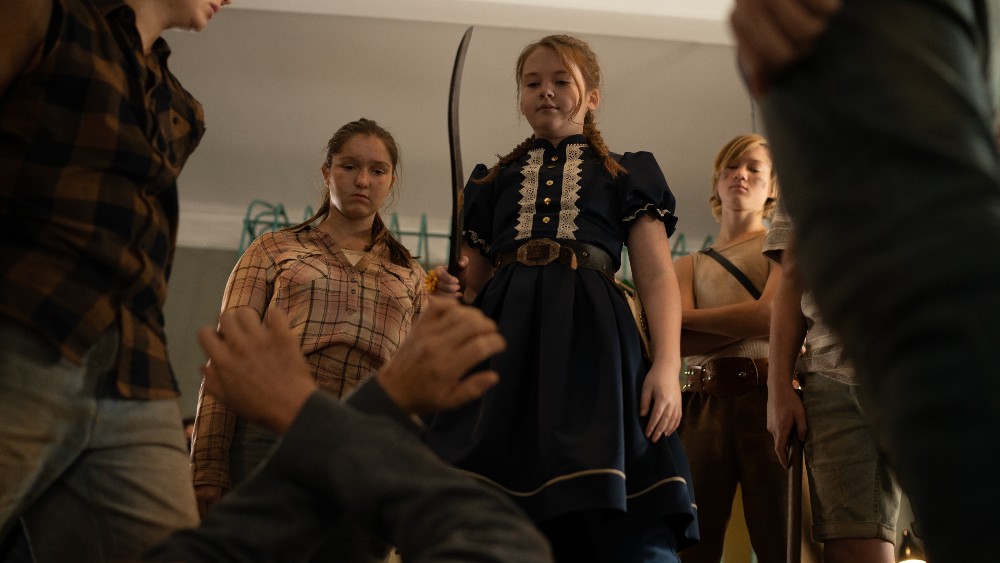
ATL: When you started adapting King’s story, you probably knew that you’d have to find the right kids to pull off these characters, especially Eden, who is so pivotal. So how did you go about finding them? Did you get a casting director and just go for broke?
Wimmer: Yeah, we had a casting director, sure. I wouldn’t know where to begin, but we looked at every girl of that age in the nation, from about eight to 12. We looked at all of them, and there are some really good young ladies; I wish I could have cast them all. Unfortunately, you have to just pick one, and I’m very happy with the one I picked, Kate Moyer, who is just an absolutely sensational actress.
ATL: While you were looking for Eden, did you end up finding any other girls who you could cast in other roles?
Wimmer: Well, no. Because of the limitations of our movie, and the limitation of our budget, we shot the entire thing in Australia. The only people that we had the means to bring in [were] our two leads — Elena Kampouris, who played Boleyn, and Kate Moyer, who played Eden. Otherwise, we had to… and I shouldn’t say “I had to,” because Australia has a lot of great little actors in it, which I think is proven in the movie. We were lucky enough to cast locally in Australia.
ATL: Was it tricky finding enough young Australian actors who could pull off the midwestern accents required of a movie set in Nebraska? I’m not sure anyone would even realize this was made in Australia…
Wimmer: Oh, good, I’m glad to hear that. The first thing Australians do, I learned, when they’re born, is they start learning American accents. You go over there, and they can speak a dead-on American accent. Whereas you and I cannot speak in an Australian accent, we can [only] fake it. I honestly can tell you they must have to take mandatory classes in grade school on American accents. I mean, all of our biggest actors are all Australian, right? Chris Hemsworth and Margot Robbie — they don’t have any accents whatsoever, so it goes on and on. Australia’s a great place to shoot for that reason.
ATL: I’ve spoken to many Australian actors over the years who’ve said they watch a lot of American television and they mimic it, but I always assumed it was just kids who wanted to be actors, not everyone.
Wimmer: Everybody who plans on being an actor does it. I kid not. That’s the first thing they do, because they love Australia, but they do want to come to Hollywood if they’re going to be actors. Ultimately, they know they’re going to have to speak without an Australian accent.
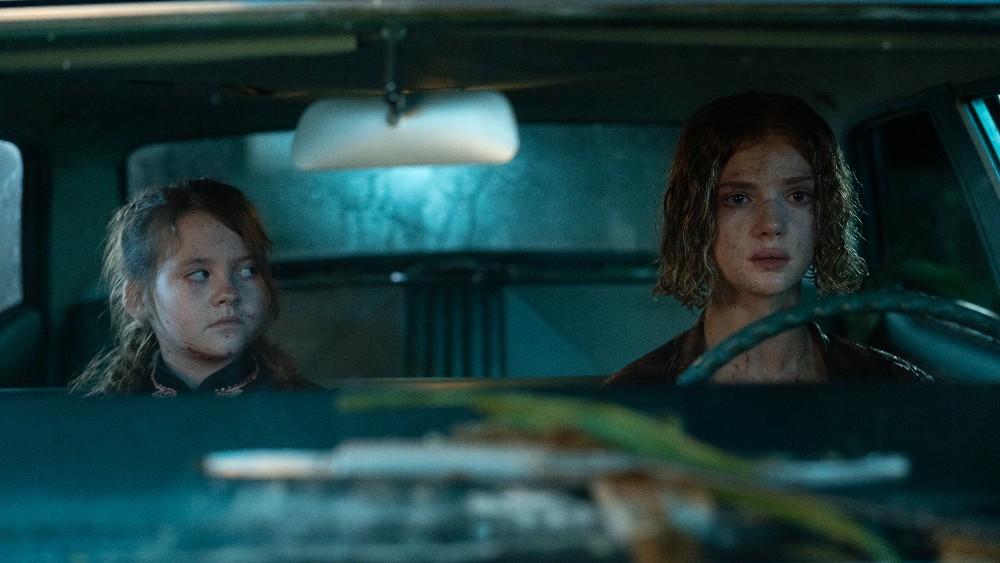
ATL: There’s obviously a very well-known adage about working with kids and animals, but these kids have to carry the movie. How did you work with them and get them into the right headspace for the horrors they would be experiencing and/or creating?
Wimmer: I had a great first AD named Sean Harner, and he was very good about wrangling kids, but because we were shooting in [the middle of] COVID, we were the only film shooting on earth. We shot this in April 2020, and COVID had shut down all of the productions. We had to invent these COVID filming protocols, and one of them, of course, which now everybody’s familiar [with], was the bubble, but it really hadn’t been done before. And so, we created this bubble, and that had an added and unforeseen side effect, which was that all these kids spent all… usually on a film, at the end of shooting, kids go home and they go to their families, eat dinner, etc. In this case, they became each other’s families. They hung out with each other after filming. They spent all their time with each other, so they really became a tribe in doing that, and not only as the cameras were pointed at them, [but] all the time. There was no break from it. This wasn’t planned, it really just worked out for us, but they became unconscious of the camera, and they weren’t self-conscious like so many kids are on camera. They weren’t acting as friends or as fellow Nebraskans, they really were by the end, so that was very helpful. And they were good little actors, too.
ATL: Because you’re shooting in Australia, you would obviously need to find cornfields, since that’s a pervasive aspect of the movie. Are there areas where corn is grown there? Did you have to create the cornfields or was it some combination of both?
Wimmer: We grew it. We grew 50 acres of corn there, about 20 or 25 miles outside of Sydney. We found a really beautiful place called Richmond. It’s mostly horse country out there, and we found a place that allowed us to grow corn. So, I’m a corn farmer now.
ATL: I think I read that this was in production in April 2020. I know Australia could seal itself off from the rest of the world, but I was surprised you were able to film.
Wimmer: Just us.
ATL: Did you stay there to do post, or did you come back home?
Wimmer: I came back to America, and we were all dealing with COVID at the time, and I went back and I quarantined in West Australia to finish the movie. COVID made everything extremely difficult back then. It was impossible to release a film, and it was impossible to do [much of] anything, but we got it done.
ATL: This may be considered a spoiler, but that cornfield you grew, did you actually end up burning it down?
Wimmer: We burnt some of it down, yeah, for sure. It doesn’t burn that well, either, but we got it to burn, more or less. There are some fire effects we added, too, but we definitely set some of it on fire.
ATL: Again, I don’t want to spoil too much, but there are definitely some visual effects in the last act…
Wimmer: Are you talking about He Who Walks? He exists in the movie, or maybe he doesn’t. We don’t know for sure, because those kids are playing in these dying cornfields that are covered in this fungus that grows on dying crops and causes hallucinations. Obviously, Boleyn is hallucinating at the beginning, so it’s a question of what’s real and what’s not.
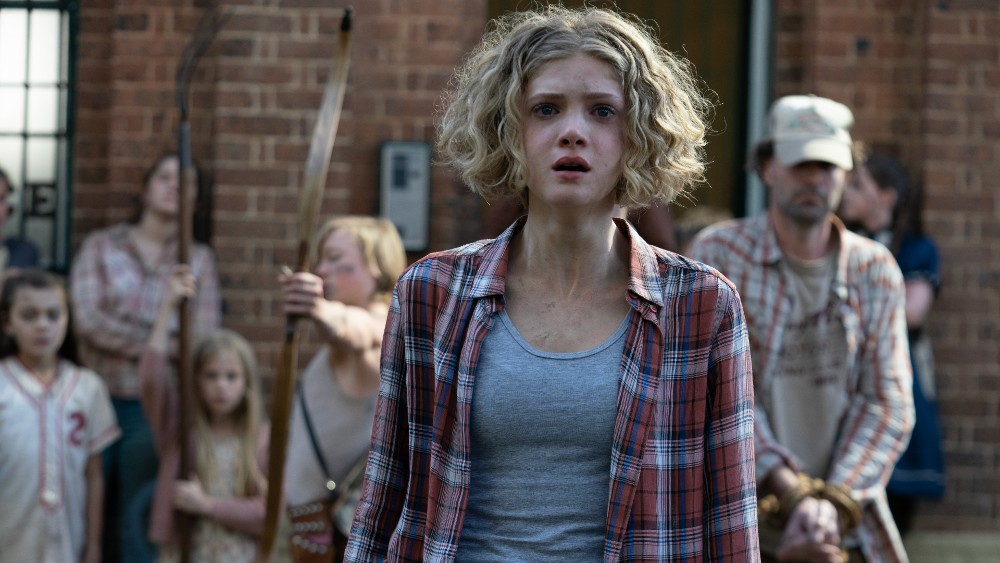
ATL: But there obviously are visual effects involved in creating He Who Walks, so did you have someone on set portraying him for the benefit of the actors?
Wimmer: No, no, not really. I mean, given the fact that he’s nine feet tall, it would have been difficult. We did have a guy walking around on stilts for a while, and it was quite good. There were a lot of things we did, but really, it’s about creating eyelines once you really decide you’ve nailed down how large the creature is, and creating eyelines for your cast and making sure they’re all looking in the right direction. It always drives me nuts, but I see it all the time. You see the eyelines split across the camera and people are looking at the same thing. We think they’re not, but they are. That was the primary challenge, because we ended up creating He Who Walks.
ATL: Forgive me if I’m wrong, but I think this film has been done and making the festival rounds since 2020, no?
Wimmer: No, it was done in 2020, but our release got derailed by COVID. We thought we could do it, but then we realized it was impossible because the theaters were just dead. It really wasn’t until Tom Cruise came along last summer and saved theatrical that the conversation could even really be about how you release this film.
ATL: Was it important for you for it to have a theatrical release?
Wimmer: Of course. Of course. I mean, that’s why I really make movies, to see them theatrically. I love it. I still go see movies every weekend in the theater.
ATL: Same here. Have you been writing other stuff since this was completed and waiting for release?
Wimmer: Yeah, lots of stuff. We’re making a movie — in fact, we’re posting it right now — called The Beekeeper that David Ayer directed. That should come out sometime later this year, and in the meantime, I just try to keep writing.
ATL: I know many writers go into directing, since they spend months and even years writing something, and then they have to hand it over to a director and they aren’t able to stay involved. Have you been able to remove yourself from such a mindset?
Wimmer: All the time, because it’s fraught with peril when you give it to somebody else. Very rarely have I [written] a script [and seen it] turn out the way I wrote it. Thomas Crown [Affair, the 1999 remake] turned out the way I wrote it, almost exactly. Law Abiding Citizen turned out pretty much exactly the way I wrote it. But oftentimes, you have no control over what’s going to happen. Even if you direct a movie, you don’t have complete control by any stretch of the imagination, because there are all sorts of environmental factors, like the environment, budget, [and] the time you have to shoot a movie, and they impact how a movie is made. You only have control within the bubble of those factors.
ATL: You’ve been doing this for a while, so has it been getting easier for someone who might want to write and direct their own material?
Wimmer: No, it’s far worse, and it’s terrible because they don’t make films that don’t have IP anymore. It’s just really, really, really bad for people trying to break in right now. It’s quite unfair. I can’t wait for it to change. The age of, “Oh, that’s a really great idea for a movie” is long gone. They want to know, “Well, what’s it based on? And who’s starring in it? And who’s directing it?” I highly recommend — if someone wants to do that, and I’m actually online right now, writing a script live and posting all the raw data every day, and I’m going to take it, God willing, through production — but for someone who wants to do it, the short version is, I highly recommend to start with horror. It’s one of the few things that doesn’t require a star, and the cheaper it’s made, the better it is. And it’s still theatrical. It’s one of the few things that they’ll still release theatrically, because every week, frankly, a new generation changes and they need their own horror films. Going back and watching Carrie over and over again, even as great as it is, won’t do it for them. They need their own thing that they can go to see on date night and Friday night. So, horror is always going to work.
ATL: As Jason Blum has figured out. I’m pretty optimistic things are changing, especially if something as original as Everything Everywhere All at Once can win Best Picture on Sunday. Perhaps more studios will take chances with original ideas if it does.
Wimmer: That’s a tricky one. I really love that film, but it can’t be imitated. It can’t be compartmentalized. It can’t be described. It’ll have that impact for the directors of it, for sure, but I don’t think you’re gonna be able to say, “Hey, look, I’ve got this screenplay that’s absolutely insane,” and people are gonna say, “Maybe it’s the next Everything Everywhere All at Once. Let’s throw $25 million at that.” I don’t see that happening.
They are relatively simple-minded in this town, and if it looks like [John] Wick and quacks like Wick, then maybe you have a shot, particularly if you have an actor attached. They’ll go for really clever, very contained horror films, though, that are based on a really clever premise, I think, where the writing is really great. I think that — and again, I’m repeating myself — but that’s the best way for young new writers to come in, do their thing, break in, and direct their own stuff, potentially.
Children of the Corn is now playing in select theaters courtesy of RLJE Films, and it will be available to buy or rent on all major VOD/digital platforms on March 21.


